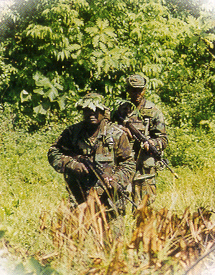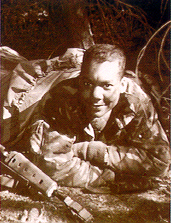|
||||||||||||||||||||||||||||||||||||
| Home > Info Centre > Publications > Alert 1998 > Infantry – Why Not? | ||||||||||||||||||||||||||||||||||||
|
|
I had taken an extra hour to get dressed, ensuring that my
navy blue suit hung correctly by all accounts I looked smart. I could feel the butterflies
in my stomach as I ascended the grand steps of the JDF Headquarters. I had only sent in an
application a few weeks ago, and received a call asking me to attend an interview. The
secretary seated outside the main office directed me to enter. The office was long and
narrow and seated at the end was a tall, medium built officer. I could feel a bead of
sweat trickling down my inside seam; my hands were clammy. I nervously took a seat at the
opposite end of the mahogany desk. I returned geared up, ready to conquer the world, after all I was infantry trained. I had been on course with three other male officer cadets. On reporting to the JDF HQ, we were given our postings. Two were posted to the First Battalion Jamaica Regiment and the other to the Second Battalion Jamaica Regiment, and me? to the Support and Services Battalion, as the Assistant Adjutant. I was to find out later, that the only persons ever to hold that position had all been female officers, and that no such post existed on the establishment of the battalion.
Frustrated and angry, I felt I had been cheated of the opportunity to command. So when the opportunity arose for me to be the reserve officer for a five-mile combat march followed by a combat shoot, I grabbed it. For four weeks I was a platoon commander. I trained, ate and lived with the men on the range; looked after their administration and disciplined them when necessary. The combat shoot was never a problem as I was a good shot. It was the five-mile route from the Caymanas Polo Club through Sufferers Heights to Twickenham Park Range that was miserable especially at ten o’clock in the morning. Dressed in combat order, boots, webbing, helmet, combats and rifle; this was no pleasure jog through the Caymanas Hills. Tears rolled down my cheeks when I crossed the finish line. I don’t know if I was glad I had completed the run or that I had realised that I would have to do it again at least ten more times before the competition. The route had taken everything I had. The march was to be completed in 50 minutes. My fastest time was fifty-three minutes, so I was axed, one week before the competition. Yes, all my postings have been administrative, sitting behind a desk supporting the troops that are on the streets day and night. I have come to realise that the army isn’t just about being an infanteer; it’s about service. Not where you serve, but how you serve; always ensuring that you give one hundred and one percent. Although some women have crossed the barrier and have served as technicians, air traffic controllers, pilots, engineers and able seamen, a large majority still hold ‘traditional female jobs’. There are still no women in the infantry; but then again, the army is changing.
|
|||||||||||||||||||||||||||||||||||
|
|
||||||||||||||||||||||||||||||||||||


